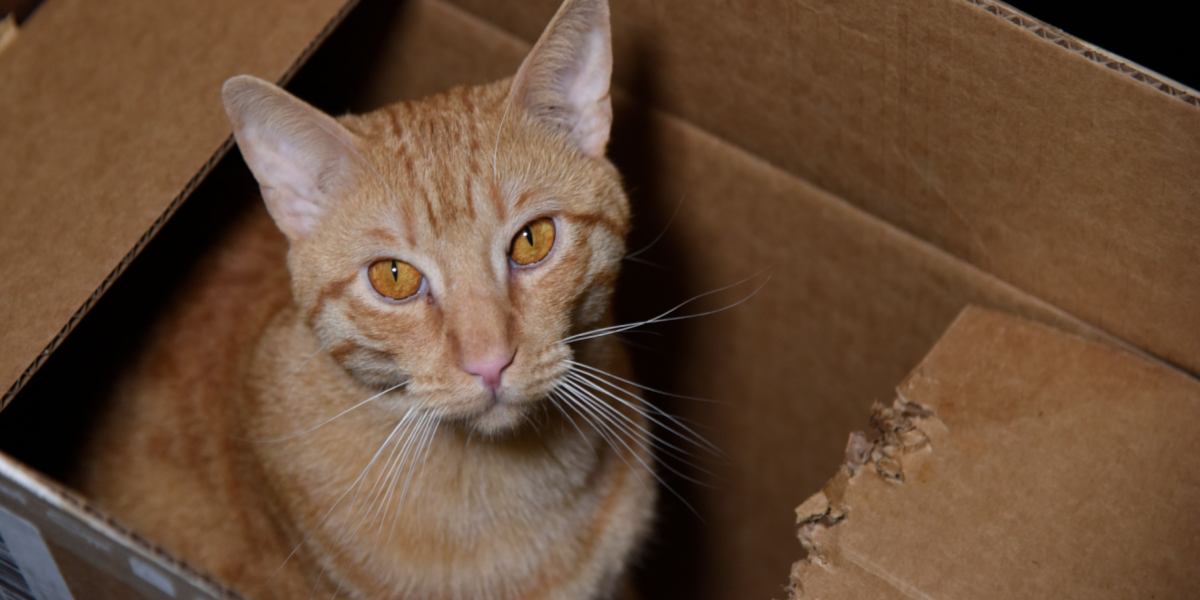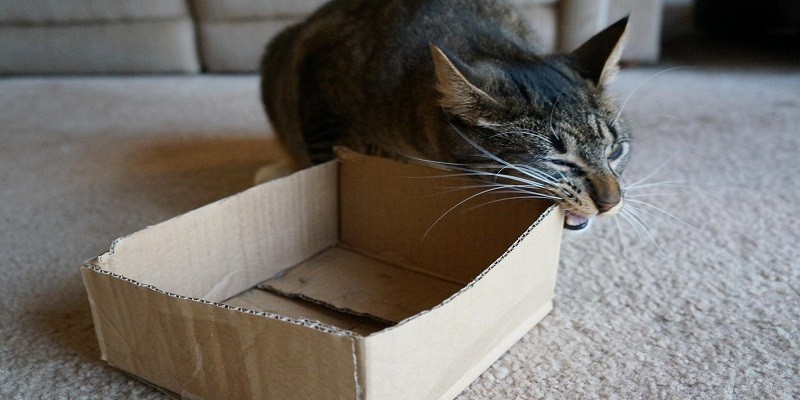Last Updated on January 14, 2025 by Pauline G. Carter
Cats chew cardboard due to the texture and taste of the material, as well as to alleviate boredom or stress. Cardboard offers a satisfying chew and may help maintain dental health by keeping their teeth clean and strong.
Some cats may also chew cardboard as a form of play or exploration. However, excessive chewing can damage the digestive system and lead to intestinal blockages, which can be life-threatening. If your cat is compulsively chewing cardboard, it is best to provide alternative forms of stimulation and consult with a veterinarian to rule out underlying health issues.
Understanding why your cat is chewing cardboard can help prevent potential health problems and keep your furry friend happy and healthy.

Credit: cats.com
Understanding The Reasons Behind This Common Behavior
Discussing The Prevalence Of Cardboard-Chewing In Cats
If you’re concerned about your cat’s cardboard-chewing habit, you’re not alone. This is a common behavior among cats, especially kittens and younger felines. According to a study, nearly one-third of cat owners reported that their cats chew on cardboard or paper products.
While it might seem like a harmless behavior, excessive cardboard-chewing could indicate an underlying problem.
Identifying Some Of The Possible Causes Of This Behavior
There are several reasons why cats may chew on cardboard. Here are some of the most common causes:
- Boredom: Cats are curious and playful animals that need mental and physical stimulation. If they do not receive adequate attention and toys to play with, they may resort to chewing on cardboard to pass the time.
- Teething: Kittens may chew on cardboard as a developmental behavior, much like human babies who need to chew on things while their teeth are growing.
- Dental problems: Cats may also chew on cardboard to alleviate dental discomfort when they have an underlying dental issue.
- Nutritional deficiencies: Sometimes cats may chew on cardboard as an indicator of a nutritional deficiency. If they are not consuming enough fiber, they may try to compensate for this by chewing on other materials.
Highlighting The Importance Of Recognizing The Root Cause Of The Behavior
It is crucial to determine the underlying reason behind your cat’s cardboard-chewing habit. Once you have identified the cause of the behavior, you can take steps to address it. This could include providing more toys and interactive playtime, addressing dental or nutritional issues, or consulting with a veterinarian to get a professional opinion.
By pinpointing and treating the root cause of the behavior, you can help your cat to lead a happier and healthier life.
Tips On How To Prevent And Manage Cardboard-Chewing
Why Does My Cat Chew Cardboard?
Cats are one of the most curious pets, and they usually find delight in playing with items we never thought they would like. One of these unexpected items is cardboard, and it turns out that many cats love to chew it.
While it might seem like a harmless behavior, constantly chewing cardboard can be problematic, leading to dental issues, digestive problems, and stomach upset. This blog post is dedicated to providing essential tips on preventing and managing cardboard chewing in your cat.
Providing Alternative Sources Of Mental Stimulation
Cats need mental stimulation to keep them active, healthy, and happy. When they feel bored, they tend to seek out activities that can stimulate their minds, including chewing cardboard. As a cat owner, you should provide your cat with alternative sources of mental stimulation to divert their attention away from cardboard.
Here are some tips:
- Provide interactive toys such as puzzle feeders, treat dispensers, and wand toys that can keep your cat busy.
- Offer a variety of toys with different textures, shapes, and sizes to pique your cat’s interest.
- Rotate your cat’s toys regularly to keep them engaged and curious.
Ensuring Appropriate Dental Care
Chewing cardboard can lead to dental issues, so it’s important to ensure your cat’s dental health. Here’s what you can do:
- Schedule regular dental checkups with your veterinarian to keep your cat’s teeth clean and healthy.
- Offer dental chews or treats that can help clean your cat’s teeth and reduce plaque buildup.
- Brush your cat’s teeth regularly to keep them clean and free of debris.
Creating A Stress-Free Environment
Stress can trigger destructive behavior in cats, including chewing cardboard. Here are some ways to create a stress-free environment for your cat:
- Provide a comfortable and safe space for your cat to retreat when they feel overwhelmed or anxious.
- Use feline pheromones or herbal remedies to help calm your cat.
- Spend quality time with your cat. Engage in playtime, cuddling, or grooming sessions to help reduce their stress levels.
Cardboard chewing can be an innocent behavior, but it can lead to health issues if left unchecked. By providing alternative sources of mental stimulation, ensuring appropriate dental care, and creating a stress-free environment, you can prevent and manage cardboard chewing in your cat.
Remember to consult with your veterinarian if you notice any unusual behavior or signs of ill-health in your feline friend.
When To Seek Veterinary Advice
Why Does My Cat Chew Cardboard?
Cats have interesting habits, and one of them is their tendency to chew on cardboard. While it may seem like an unusual behavior, it is relatively common among domestic cats. However, excessive chewing could indicate an underlying medical condition. As a loving cat owner, knowing when to seek veterinary advice is crucial.
In this section, we will [. . . ]
Discussing When The Behavior Becomes Excessive Or Harmful
As mentioned, cats chewing on cardboard is relatively normal. However, if your feline companion starts displaying the following behaviors, seeking veterinary advice is recommended:
- Consistently chewing on inappropriate objects apart from cardboard.
- Gagging, vomiting, or coughing while or shortly after chewing.
- Displaying signs of gastrointestinal distress, such as diarrhea or constipation.
- Constantly losing weight or showing signs of malnutrition.
Highlighting The Importance Of Consulting A Veterinarian
Cats may chew on cardboard for various reasons. But if you notice excessive or abnormal chewing, it’s advisable to have your cat checked by a veterinarian. The veterinarian will conduct a thorough examination and may recommend further testing to determine the cause of the behavior.
Explaining Some Of The Potential Medical Conditions That Could Cause Excessive Chewing
Cats often chew on objects to help relieve stress and anxiety. But if your cat’s chewing becomes obsessive or compulsive, it could be due to an underlying medical condition. These conditions include:
- Dental issues, such as gingivitis or broken or abscessed teeth.
- Nutritional deficiencies, such as lack of fiber or anemia.
- Hyperthyroidism, a condition characterized by an overproduction of thyroid hormones.
- Feline infectious peritonitis, a viral infection caused by feline coronavirus.
Stating The Importance Of Early Detection And Treatment
It’s essential to detect and treat any underlying medical issue as early as possible. This early detection can help prevent the condition from worsening and causing more significant health problems for your cat. Therefore, if you notice any unusual behavior in your cat, such as excessive chewing, take prompt action and seek veterinary advice.
Chewing on cardboard is a normal behavior for cats as long as it doesn’t become excessive or abnormal. As a responsible pet owner, it’s essential to observe your cat’s behavior, take prompt action, and seek veterinary advice when necessary.
Frequently Asked Questions On Why Does My Cat Chew Cardboard?
Why Do Cats Like To Chew On Cardboard?
Cats enjoy the texture of cardboard and the sensation of chewing. It also helps to sharpen their teeth.
Is It Safe For Cats To Eat Cardboard?
Eating cardboard is not harmful to cats as long as they do not swallow large pieces.
How Can I Discourage My Cat From Chewing Cardboard?
Try providing your cat with toys, scratching posts, and treats to redirect their chewing behavior.
Can Chewing On Cardboard Be A Sign Of A Health Issue?
If your cat is excessively chewing on cardboard, it could indicate a nutritional deficiency or dental problem. Consult a vet.
What Types Of Cardboard Are Safe For Cats To Chew On?
Clean, plain cardboard without any coatings or dyes is safe for cats to chew on. Avoid any cardboard with adhesives or inks.
Conclusion
To sum up, cats have strange yet hilarious behaviors that keep us entertained for hours on end. One of those behaviors includes chewing cardboard. While it may seem odd, there are a few reasons why your feline friend might choose to snack on your boxes.
Sometimes it’s a way to alleviate boredom, and other times it could be due to stress or anxiety. Making sure your cat has plenty of toys and playtime can help reduce cardboard munching. Overall, it’s important to monitor your cat’s behavior and see if there are any underlying issues causing their unusual snacking habit.
If you’re ever concerned, don’t hesitate to speak with your vet for additional guidance. Remember, while it may be strange, it’s just one of the many quirks that make our cats so unique and lovable.

